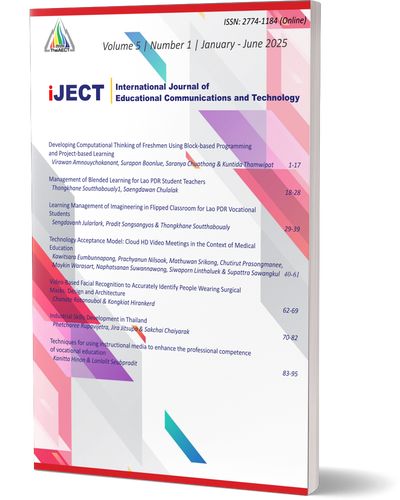Student Relationship Management with Adaptive AI
Keywords:
Student Relationship Management, Adaptive AI, Student Engagement, Student RetentionAbstract
The integration of Adaptive Artificial Intelligence (AI) into Student Relationship Management (SRM) has emerged as a transformative strategy for enhancing student engagement, retention, and academic success. By leveraging AI-driven technologies, educational institutions can personalize student interactions, anticipate academic challenges, and optimize decision-making processes. This study examines the role of Adaptive AI in SRM, utilizing a systematic review and bibliometric analysis to synthesize existing research on AI-driven SRM frameworks. A conceptual structure for the integration of Adaptive AI into student management strategies is proposed, highlighting its potential to create a more responsive and student-centric educational environment.
The findings emphasize the advantages of data-driven decision-making, predictive analytics, and personalized support mechanisms in improving institutional efficiency and student outcomes. Furthermore, this study explores key challenges associated with the implementation of AI in SRM, including technological constraints, ethical considerations, and data privacy concerns. As AI continues to shape the future of higher education, understanding its implications is critical for educators, policymakers, and institutional leaders. This research contributes to the growing body of knowledge on AI-enhanced SRM and provides valuable insights into best practices for integrating Adaptive AI into student support services. The study underscores the need for a strategic, data-informed approach to SRM, ensuring that AI-driven solutions align with institutional goals and student needs.
References
Alyahyan, E., & Düştegör, D. (2020). Predicting academic success in higher education: literature review and best practices. International Journal of Educational Technology in Higher Education, 17(3). https://doi.org/10.1186/s41239-020-0177-7
Gholami, H., Saman, M. Z. M., Mardani, A., Streimikiene, D., Sharif, S., & Zakuan, N. (2018). Proposed analytic framework for student relationship management based on a systematic review of CRM systems literature. Sustainability (Switzerland), 10(4). https://doi.org/10.3390/su10041237
Halkiopoulos, C., & Gkintoni, E. (2024). Leveraging AI in E-Learning: Personalized Learning and Adaptive Assessment through Cognitive Neuropsychology—A Systematic Analysis. Electronics (Switzerland), 13(18). https://doi.org/10.3390/electronics13183762
Issaro, S., & Wannapiroon, P. (2023). Intelligent Student Relationship Management Platform with Machine Learning for Student Empowerment. International Journal of Emerging Technologies in Learning (IJET), 18(04), 66–87. https://doi.org/10.3991/ijet.v18i04.32583
Joshi, M. (2024). Adaptive Learning through Artificial Intelligence. International Journal on Integrated Education, 7, 41–43. https://doi.org/10.2139/ssrn.4514887
Lai, T., Xie, C., Ruan, M., Wang, Z., Lu, H., & Fu, S. (2023). Influence of artificial intelligence in education on adolescents’ social adaptability: The mediatory role of social support. PLoS ONE, 18(3). https://doi.org/10.1371/journal.pone.0283170
Langeveldt, D. C. (2024). AI-Driven Leadership: A Conceptual Framework for Educational Decision-Making in the AI Era. E-Journal of Humanities, Arts and Social Sciences, 1582–1595. https://doi.org/10.38159/ehass.20245812
Loureiro, S. M. C., Guerreiro, J., & Tussyadiah, I. (2021). Artificial intelligence in business: State of the art and future research agenda. Journal of Business Research, 129, 911–926. https://doi.org/https://doi.org/10.1016/j.jbusres.2020.11.001
Murtiningsih, D. (2020). Brand trust as mediation variable of customer relationship management influence on student loyalty. Proceedings of the International Conference on IT, Communication and Technology for Better Life, ICT4BL 2019, 71–75. https://doi.org/10.5220/0008929500710075
Olusegun, J., Flypaper, D., Oluwaseyi, J., & Brightwood, S. (2024). Ai-driven adaptive learning systems: enhancing student engagement.
Orji, F. A., Fatahi, S., & Vassileva, J. (2023). Data-Driven Approach for Student Engagement Modelling Based on Learning Behaviour. Communications in Computer and Information Science, 1834 CCIS, 334–342. https://doi.org/10.1007/978-3-031-35998-9_46
Owoc, M. L., Sawicka, A., & Weichbroth, P. (2021). Artificial Intelligence Technologies in Education: Benefits, Challenges and Strategies of Implementation. In M. L. Owoc & M. Pondel (Eds.), Artificial Intelligence for Knowledge Management (pp. 37–58). Springer International Publishing.
Page, M. J., McKenzie, J. E., Bossuyt, P. M., Boutron, I., Hoffmann, T. C., Mulrow, C. D., Shamseer, L., Tetzlaff, J. M., Akl, E. A., Brennan, S. E., Chou, R., Glanville, J., Grimshaw, J. M., Hróbjartsson, A., Lalu, M. M., Li, T., Loder, E. W., Mayo-Wilson, E., McDonald, S., … Moher, D. (2021). The PRISMA 2020 statement: An updated guideline for reporting systematic reviews. In The BMJ (Vol. 372). BMJ Publishing Group. https://doi.org/10.1136/bmj.n71
Phuengrod, S., Wannapiroon, P., & Nilsook, P. (2021). The Student Relationship Management System Process with Intelligent Conversational Agent Platform. Higher Education Studies, 11(2), 147. https://doi.org/10.5539/hes.v11n2p147
Sánchez, J. M., Rodríguez, J. P., & Espitia, H. E. (2020). Review of artificial intelligence applied in decision-making processes in agricultural public policy. Processes, 8(11), 1–23. https://doi.org/10.3390/pr8111374
Srisakonsub, P., Jeerungsuwan, N., & Piriyasurawong, P. (2019). Student Relation Management on Cloud Technology for Academic and Internship Counseling Model in Rajabhat University. Higher Education Studies, 9(4), 148. https://doi.org/10.5539/hes.v9n4p148
Strielkowski, W., Grebennikova, V., Lisovskiy, A., Rakhimova, G., & Vasileva, T. (2024). AI-driven adaptive learning for sustainable educational transformation. In Sustainable Development. John Wiley and Sons Ltd. https://doi.org/10.1002/sd.3221
Vashishth, T., Kumar, B., Chaudhary, S., Sharma, K., Panwar, R., & Sharma, Mr. V. (2024). AI-Driven Learning Analytics for Personalized Feedback and Assessment in Higher Education. In Using Traditional Design Methods to Enhance AI-Driven Decision Making (pp. 206–230). IGI Global Scientific Publishing. https://doi.org/10.4018/979-8-3693-0639-0.ch009
Wang, X., Huang, R. “Tammy,” Sommer, M., Pei, B., Shidfar, P., Rehman, M. S., Ritzhaupt, A. D., & Martin, F. (2024). The Efficacy of Artificial Intelligence-Enabled Adaptive Learning Systems From 2010 to 2022 on Learner Outcomes: A Meta-Analysis. Journal of Educational Computing Research, 62(6), 1568–1603. https://doi.org/10.1177/07356331241240459
Wu, C., Zhang, H., & Carroll, J. M. (2024). AI Governance in Higher Education: Case Studies of Guidance at Big Ten Universities. Future Internet, 16(10). https://doi.org/10.3390/fi16100354
Zeide, E. (2019). Artificial Intelligence in Higher Education: Applications, Promise and Perils, and Ethical Questions. https://er.educause.edu/articles/2019/8/artificial-intelligence-in-higher-education-applications-promise-and-perils-and-ethical-questions
Zhou, C. (2023). Integration of modern technologies in higher education on the example of artificial intelligence use. Education and Information Technologies, 28, 3893–3910. https://doi.org/10.1007/s10639-022-11309-9
Downloads
Published
How to Cite
Issue
Section
License
Copyright (c) 2025 International Journal of Educational Communications and Technology

This work is licensed under a Creative Commons Attribution-NonCommercial-NoDerivatives 4.0 International License.







